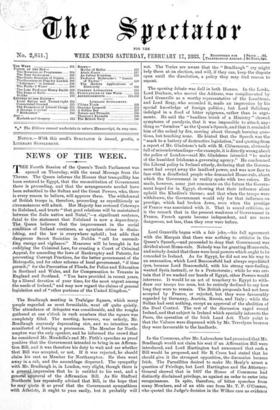The opening debate was dull in both Houses. In the
Lords, Lord Durham, who moved the Address, was complimented by Lord Granville as a worthy representative of the Lambtons, and Lord Reay, who seconded it, made an impression by his special knowledge of foreign politics ; but Lord Salisbury indulged in a flood of bitter epigrams, rather than in argu- ments. He said the "headless trunk of a Ministry" showed symptoms of paralysis, that it was impossible to attack any- thing so "formless" as the Queen's Speech, and that it reminded him of the ordeal by fire, moving about through burning ques- tions, but touching none. He hinted that the Speech was the "mask to a battery of destructive legislation," and quoting from a report of Mr. Gladstone's talk with M. Ch5menceau, obviously full of misunderstandings—for example, it is directly wrong about the police of London—said Mr. Gladstone intended "to make of the humblest Irishman a governing agency:" He condemned the Liberal policy in Ireland utterly, declaring that the Govern- ment had swept away the landlord power, and was now face to face with a disaffected people who demanded Home-rule, about which the Government in reality spoke with two voices. He made, however, some jest comments on the future the Govern- ment hoped for in Egypt, showing that their influence alone upheld the Khedive's throne ; and that when the troops were withdrawn, the Government would rely for that influence on prestige, which had broken down, even when the prestige of France was associated with it. That is sound criticism, as is the remark that in the present weakness of Government in France, French agents become independent, and are more dangerous, not less, than they ever were before.














































